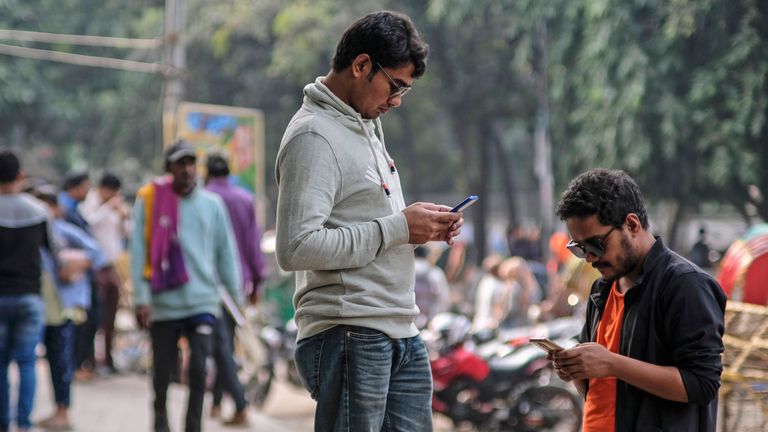Divyendra Jadoun is proud of his professional alias: the Indian Deepfaker.
“I know we do deepfakes,” he tells Sky News. “Why would I use something else?”
And Jadoun’s services have been in demand recently, as India holds elections – often billed as the biggest democratic election on the planet.
Deepfakes have been a feature, in some surprising ways. On occasion, they have been malicious. Bollywood actors have been falsely depicted criticising PM Narendra Modi, or endorsing a political party.
Jadoun says: “We received a lot of requests, from November, October. And out of those requests, around 45 to 50% requests were for unethical [deepfakes]. And these are two kinds of requests.
“One is to swap the face of the political leader and put it into some controversial video that might harm his image. The second type of unethical [deepfake] is to create the clone of, the voice of the opponent leader and make him say something that he has never said.”
“This is the first time that we are going to see the deployment of deepfakes on a large scale. Even for us, it’s a new thing.
“We do not know how much it will impact or whether it will have an impact or not.”
Others point to the low numbers of views those deepfake videos tend to receive, along with the speed at which they get debunked – and say that the impact of deepfakes has been, perhaps unexpectedly, positive.
“There was a fear that deepfake type of things would be more used for adversarial content, whereas what we are seeing is the opposite,” explains Joyojeet Pal, associate professor of information at the University of Michigan.
“The artificially generated content is much more being used by the campaigns of politicians in their own interest.”
Witness the resurrection of M Karunanidhi, a politician who died in 2018. A deepfake of him was created by technologist Senthil Nayagam and subsequently put on the campaign trail, endorsing various candidates.
“We accidentally started the trend with this video,” Nayagam tells Sky News.
The Indian Deepfaker has worked on another system that shows the potential innovation of deepfakes.
“We are doing a conversational agent where you will get a call in the voice of a leader. It will be saying that I am an AI-generated avatar of this leader, and he will be taking the name of the person,” he says.
“He will be asking ‘What are your local issues in your area?’ or ‘What are your suggestions to the government?’ – and every call will be recorded.
“It will then be transcribed and it will be filtered out based on different questions, so that the government or the political parties can make manifestos or can create schemes according to the problem.”
There are still pitfalls. Jadoun is worried about deepfakes spreading through the messaging system WhatsApp rather than the open internet, where they are easier to debunk. WhatsApp is where more traditional misinformation has spread, according to Amber Sinha.
“I think it’s also been early days, in terms of [the deepfake] use case in India,” he tells Sky News.
“There have been other modes of content, for instance, doctored images, Photoshopped images that have been prevalent, particularly on WhatsApp groups, for much longer in India.”
WhatsApp is, for many people in India, simply the internet. Platforms that dominate in other democracies remain niche. Take ad spending on Meta, which owns Facebook and Instagram (and WhatsApp, although it doesn’t show ads).
The ruling BJP is clearly dominating, according to the data provided by Who Targets Me. But compare that to US spending.
The US isn’t even holding an election – at least not yet – and it is comfortably outspending India.
And Pal argues that other platforms have now caught up with WhatsApp.
“WhatsApp groups were the big player in the fairly recent elections as well,” he says. “YouTube is either at par or more important than WhatsApp right now.”
The most novel digital development of this election, he argues, is the emergence of YouTube influencers.
Earlier this month, for example, Curly Tales, a food blogger with more than three million followers, featured the chief minister of Maharashtra on her channel. And politicians have been making concerted attempts to woo influencers across the board.
“The most surprising thing about the campaign has been the emergence of digital influencers over professional journalists as the interviewers in the campaigns themselves,” Pal says.
“As opposed to a professional journalist who might be fairly educated about policy and can ask a politician aggressive questions about what is or is not working about their platform, a digital influencer doesn’t have that ability.”
For all the innovation, deepfakes and influencers do perhaps open up an information gap – one where doubt and misinformation can spread, inadvertently or not.



























